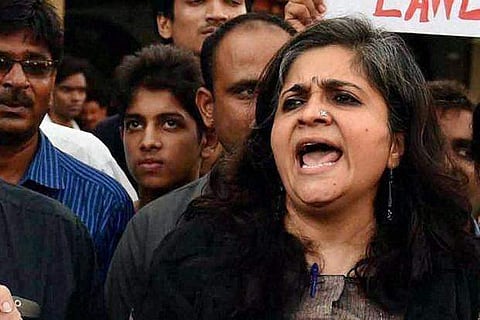

NEW DELHI: Activist Teesta Setalvad's great-grandfather Chimanlal Setalvad, a member of the Hunter Commission probing the Jallianwala Bagh massacre, was not party to the panel's verdict and gave a dissenting judgment holding Gen Reginald Dyer responsible, say historians.
Social media posts, with thousands of likes and retweets, recently claimed Chimanlal Setalvad, one of the three Indians on the seven-member panel, was among those who gave a clean chit to Dyer for his actions that fateful April 13, 1919 day.
But that is not true, countered historian Chaman Lal.
"The Hunter Commission had British as well as Indian members. The Indian members gave a separate dissenting report in which they blamed not only Dyer but also Michael O'Dwyer -- then lieutenant governor of Punjab --- for the Jallianwala Bagh massacre," Lal told PTI.
"The Indian members report, called the 'minority report', was a very strongly worded one," Lal added.
He stressed that Setalvad, a "learned member of the Hunter Commission", did not give a "clean chit" to the perpetrators of the Amritsar massacre.
British historian Kim Wagner's 2019 book "Amritsar 1919: An Empire of Fear and the Making of a Massacre'' backs Lal's submission.
It says the minority report criticised Dyer's action "more strongly" than the majority report.
Quoting from the minority report, it says the Indian members described the firing at the Jallianwala Bagh as "inhuman and un-British", even comparing it to the atrocities by German military officers in Belgium and France in 1914.
The issue of the Hunter Commission and Setalvad's role came back into the spotlight with several verified social media accounts, including that of RSS-affiliated magazine 'Organiser Weekly' and senior journalist Kanchan Gupta, attacking him.
"Did you know? Fraud activist #TeestaSetalvad is great-granddaughter of Chimanlal Harilal Setalvad. C.H.Setalvad was a member of the #HunterCommission' on the Jallianwala Bagh massacre. Hunter Commission gave a clean chit to General Dyer who ordered the firing on civilians," tweeted Organiser Weekly.
A similar post, tweeted by Kanchan Gupta, currently a senior advisor in the Ministry of Information and Broadcasting, generated almost 9,200 likes and over 4,250 retweets.
The posts followed the arrest of Teesta Setalvad in June for allegedly submitting false evidence in the 2002 Gujarat riots case.
On April 13, 1919, hundreds of people who had gathered at Amritsar's Jallianwala Bagh to stage a peaceful protest against the Rowlatt Act, which granted the colonial administration repressive powers, were gunned down by British forces led by Gen Dyer.
Though the actual death toll is still disputed, official figures put the number of people killed at 379 and wounded at over 1,200.
The four British members on the Hunter Commission were George C Rankin, Walter Francis Rice, Sir George de Symons Barrow and Thomas Smith.
The Indian members were Chimanlal Setalvad, Pandit Jagat Narayan and Sardar Sahibzada Sultan Ahmad Khan.
The panel's submissions were split into a majority and a minority report, which was signed by the three Indian members.
On October 14, 1919, the government of India announced the formation of the 'Disorders Inquiry Committee' to investigate the Jallianwala Bagh massacre.
The Committee was later called the Hunter Commission after its chairman Lord William Hunter.
"We feel that Dyer, by adopting an inhuman and un-British method of dealing with subjects of His Majesty the King Emperor, has done great disservice to the interest of British rule in India," Wagner says in the book, quoting from the minority report.
The book also says eminent jurist Chimanlal's "provocative questioning" resulted in Dyer making "self-damaging statements".
Citing an example from the Disorders Inquiry Committee report, it says Dyer's shocking admission of opening fire with machine guns if the passage was wide enough to allow the armoured cars to go inside the Jallianwala Bagh was in reply to Setalvad's question.
The book also throws light on an "unpleasant incident" that occurred between Setalvad and Lord Hunter, further proving that the Indian and British members of the Commission were not on the same page.
The incident described by Setalvad in his autobiography "Recollections and Reflections" -- and produced in Wagner's book -- describes Hunter losing his temper at Setalvad and telling him, "They (Setalvad and his Indian colleagues) want to drive the British out of the country."
Setalvad replied, "It is perfectly legitimate for Indians to be free of foreign rule and Independence can be accomplished by mutual understanding and goodwill. The driving out process will only become necessary if the British are represented in this country by people as short-sighted and intolerant as yourself."
After this, though under the same roof, we, the Indian members, ceased to talk to Lord Hunter," the book says, quoting from Setalvad's autobiography.
In fact, according to the book, the minority report of the Hunter Commission was "precisely similar" to the non-official enquiry committee report of the Congress, which had Motilal Nehru, CR Das, Abbas Tyabji, M.R.Jayakar and Mahatma Gandhi as its members. It also underscored that unlike the majority report, the minority report had blamed Dyer for not attending to the wounded."
"The Minority took a graver view of his (Dyer) responsibility and condemned his neglect as brutal and inhuman," it added.
Chimanlal Setalvad's great-granddaughter Teesta Setalvad is a Mumbai-based journalist-turned-rights activist.
She runs the NGO Citizens for Justice and Peace, formed after the 2002 Gujarat riots to provide support to the victims.
MC Setalvad, India's first attorney-general, was her grandfather.
The claim that Chimanlal Setalvad, a member of the Hunter Commission set up in 1919 to probe the Jallianwala Bagh massacre, gave a "clean chit" to Gen Reginald Dyer is 'misleading'.